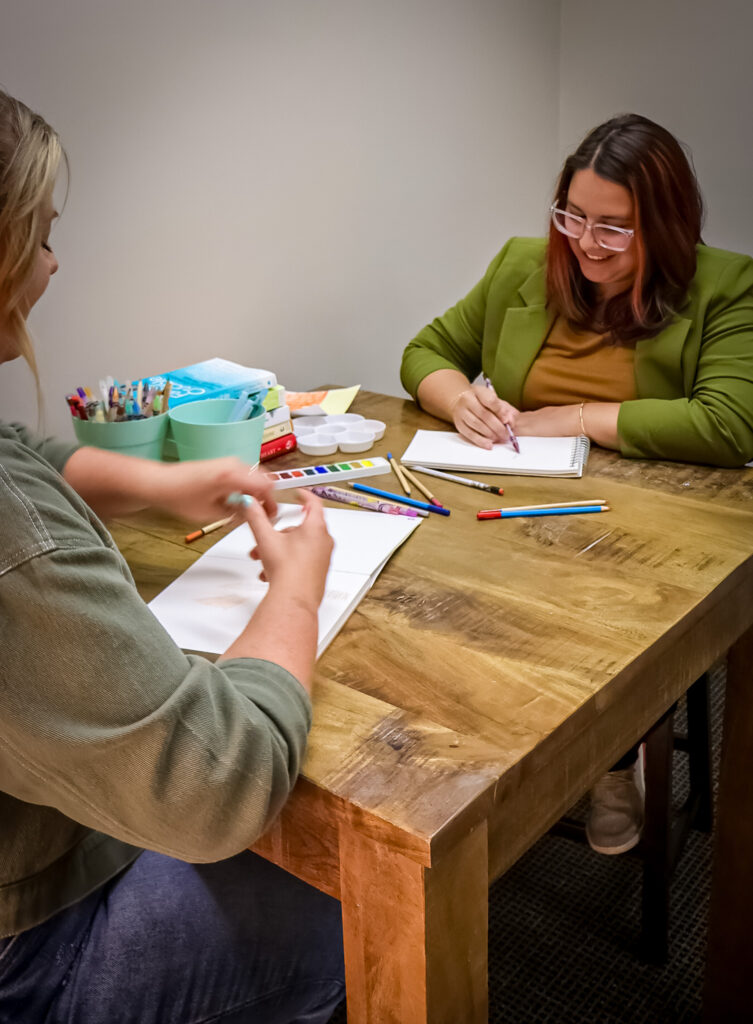Expressive Arts

Do you have a hard time vocalizing your emotions? Do you like using creative art forms? Have you tried other forms of talk therapy and they haven't quite helped?
Expressive Arts based Therapy could be helpful for you.
Who can benefit from this form of therapy?
Expressive arts-based therapy benefits a wide range of individuals, including children, adolescents, and adults facing emotional, behavioral, or developmental challenges. It is particularly helpful for trauma survivors, those with chronic illness or disabilities, and older adults, offering a safe space for expression and healing. People undergoing life transitions, seeking personal growth, or experiencing emotional difficulty can also benefit from the non-verbal outlets expressive arts provide. Couples, families, and groups in recovery use it to improve communication and build stronger connections. Additionally, those with difficulty expressing themselves verbally, such as those with speech disorders or social anxiety, can find alternative ways to communicate through creative processes. Creative professionals may also use expressive arts to overcome burnout or creative blocks. Ultimately, this therapeutic approach supports emotional regulation, self-exploration, and personal insight across a variety of life experiences and mental health concerns.


What are the Benefits of Expressive Arts Therapy?
- Emotional Expression and Healing: Provides a safe outlet for expressing difficult emotions, especially for those who struggle with verbal communication.
- Self-Exploration: Helps individuals gain insights into their inner world, fostering greater self-awareness and personal growth.
- Improved Communication Skills: Enhances both verbal and non-verbal communication, making it easier to express thoughts, feelings, and needs.
- Stress Reduction and Relaxation: Creative activities promote relaxation, lower cortisol levels, and reduce the physical symptoms of stress.
- Emotional Regulation and Resilience: Helps individuals manage intense emotions, build resilience, and cope with challenges more effectively.
- Promotion of Mindfulness and Presence: Encourages individuals to focus on the present moment, reducing anxiety and promoting a sense of calm.
- Cognitive and Motor Development: Stimulates cognitive growth, fine and gross motor skills, and overall brain functioning, particularly for children or individuals with developmental disabilities.
- Increased Self-Esteem and Confidence: Provides a sense of accomplishment and pride, boosting self-esteem and fostering a more positive self-image.
- A Non-Judgmental Space for Exploration: Offers a safe and accepting environment where individuals can experiment with new ways of thinking and being.
- Creative Problem-Solving: Encourages innovative thinking and helps individuals find new solutions to life’s challenges through creative expression.
- Fostering Social Connection and Community: In group settings, promotes collaboration and shared experiences, helping individuals feel connected and supported by others.
- Safe Exploration of Identity: Allows individuals to explore and understand aspects of their identity, such as gender, culture, or life roles, in a safe and supportive way.
- Healing Through Play: For children and some adults, play through art, music, or movement can provide a therapeutic space for emotional processing and trauma healing.
- Trauma Healing: Aids trauma survivors by providing a safe medium to process and externalize past experiences, helping individuals regain a sense of control.
- Increased Emotional Insight and Self-Awareness: Helps individuals gain clarity and insight into their emotional and psychological states, fostering a deeper understanding of themselves.
How Do I Get started with Therapy?
Book Your Free 15 Minute Consult
Book a free 15 minute phone consult with one of our therapist to ask them any questions you may have and determine if they are they right fit for you.
Set Up Your First
Session
If you feel like you and the therapist are a good fit, set up your first session. We will walk you through everything you need to know to know what to expect from therapy.
Be The Self You
Want to Be
Through the therapeutic process we will help you be the person you want to be. No matter where you are in your journey.
Which Therapists Use This Form of Therapy?

Annita Phyphers
Therapist, MC, CCC

Neeshali Piekutowski
Therapist, MA, CCC, RP(Qualifying)
